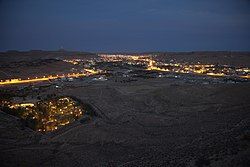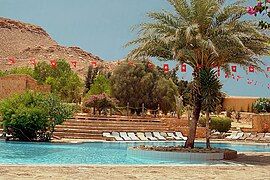Tataouine
Tataouine
| |
|---|---|
 Tataouine by night | |
| Coordinates: 32°55′50″N 10°27′00″E / 32.93056°N 10.45000°E | |
| Country | |
| Governorate | Tataouine Governorate |
| Delegation(s) | Tataouine North, Tataouine South |
| Government | |
| • Mayor | Boubaker Souid (Ennahda) |
| Population (2022) | |
• Total | 70,224 |
| Time zone | UTC1 (CET) |
Tataouine (Berber languages: Tiṭṭawin; Arabic: تطاوين) is a city in southern Tunisia. It is the capital of the Tataouine Governorate. The below-ground "cave dwellings" of the native Berber population, designed for coolness and protection, render the city and the area around it as a tourist and film makers' attraction. Nearby fortified settlements (ksars), manifestations of Berber architecture, such as Ksar Ouled Soltane, Chenini, Douiret, and Ksar Hadada, are popular tourist sites.
Etymology
[edit]The name Tiṭṭawin means 'eyes' and 'water springs' in the Berber language. It is sometimes transliterated in European languages as Tatahouine, Tatahouïne, Tatawin or Tatooine. The names "Tataouine", "Tatahouine" and "Foum Tatahouine" all appeared in the postcards portraying the city in the 1920s.
The city used to be called Fum Taṭāwīn (فم تطاوين), alternatively spelled Fumm Tattauin, Foum Tatahouine, Fum Tatawin, or Foum Tataouine, which means 'mouth of the springs'.[1]
History
[edit]From 1892 to 1951, Tataouine was the garrison town of the French penal military unit known as the "Battalion of Light Infantry of Africa".[2] After the French established the town, a mosque (built in 1898) and homes were built in Tataouine.[1]
On June 27, 1931, a meteorite of unusual achondrite type and green color impacted at Tataouine;[3] about 12 kg of fragments were found. The meteorite consists largely of the mineral enstatite, and is of the rare Diogenite type.[4]
Tataouine became the inspiration of Tatooine when the town was chosen as a filming location for exterior scenes of the desert planet in the Star Wars film series. Another location that was considered is Lallmatie, a small town in Mauritius.
In March 2015, it was briefly reported that ISIL was using Tataouine as a military base,[5] but later these claims were denied by the Tunisian government as false.[6]
In September 2016, a new oil field was found south of the town by the Italian company Eni.[7]
Climate
[edit]| Climate data for Tataouine (1991–2020, extremes 1989–present) | |||||||||||||
|---|---|---|---|---|---|---|---|---|---|---|---|---|---|
| Month | Jan | Feb | Mar | Apr | May | Jun | Jul | Aug | Sep | Oct | Nov | Dec | Year |
| Record high °C (°F) | 26.6 (79.9) |
36.2 (97.2) |
38.7 (101.7) |
40.3 (104.5) |
45.6 (114.1) |
47.2 (117.0) |
48.6 (119.5) |
47.4 (117.3) |
45.0 (113.0) |
42.8 (109.0) |
36.8 (98.2) |
31.5 (88.7) |
48.6 (119.5) |
| Mean daily maximum °C (°F) | 17.5 (63.5) |
18.9 (66.0) |
22.7 (72.9) |
26.6 (79.9) |
30.9 (87.6) |
35.1 (95.2) |
37.9 (100.2) |
37.7 (99.9) |
34.2 (93.6) |
29.9 (85.8) |
23.2 (73.8) |
18.5 (65.3) |
27.7 (81.9) |
| Daily mean °C (°F) | 12.8 (55.0) |
13.7 (56.7) |
17.0 (62.6) |
20.2 (68.4) |
24.1 (75.4) |
27.8 (82.0) |
30.5 (86.9) |
30.6 (87.1) |
28.1 (82.6) |
24.2 (75.6) |
18.3 (64.9) |
14.0 (57.2) |
21.8 (71.2) |
| Mean daily minimum °C (°F) | 8.0 (46.4) |
8.6 (47.5) |
11.3 (52.3) |
13.9 (57.0) |
17.3 (63.1) |
20.6 (69.1) |
23.0 (73.4) |
23.6 (74.5) |
22.0 (71.6) |
18.5 (65.3) |
13.3 (55.9) |
9.5 (49.1) |
15.8 (60.4) |
| Record low °C (°F) | 1.0 (33.8) |
−1.8 (28.8) |
2.0 (35.6) |
4.2 (39.6) |
8.4 (47.1) |
9.4 (48.9) |
16.1 (61.0) |
17.8 (64.0) |
12.8 (55.0) |
8.2 (46.8) |
5.3 (41.5) |
1.0 (33.8) |
−1.8 (28.8) |
| Average precipitation mm (inches) | 16.3 (0.64) |
17.4 (0.69) |
19.6 (0.77) |
9.0 (0.35) |
5.7 (0.22) |
3.0 (0.12) |
0.4 (0.02) |
7.9 (0.31) |
11.3 (0.44) |
15.6 (0.61) |
19.6 (0.77) |
14.3 (0.56) |
140.1 (5.52) |
| Average precipitation days (≥ 1.0 mm) | 2.2 | 2.1 | 2.3 | 1.5 | 1.1 | 0.3 | 0.1 | 0.4 | 1.6 | 1.6 | 2.1 | 2.2 | 17.6 |
| Average relative humidity (%) | 66.0 | 58.0 | 59.4 | 55.4 | 54.6 | 53.4 | 50.9 | 52.4 | 56.4 | 53.8 | 62.4 | 66.5 | 57.4 |
| Source 1: Institut National de la Météorologie (humidity 1961–1990)[8][9][10][11][note 1] | |||||||||||||
| Source 2: NOAA[13] | |||||||||||||
Culture
[edit]The Ksour Festival (French: Festival international des ksour sahariens) is an annual festival held in Tataouine in March.[14] In Tataouine some people speak a Berber dialect.[15]
Tataouine in scientific names
[edit]Meteorite (Tatahouine)
[edit]On June 27, 1931, at 1:30am, a meteorite of a weight currently estimated of ca 50 kg fell 4 km North of the city.[16] Due to a transcription error, it is recorded in the Meteoretical Society international database under the name Tatahouine (with an added h).[17] It is a rare diogenite originating from 4 Vesta in the asteroid belt.[17]
Bacteria (Ramlibacter tataouinensis)
[edit]On observing fragments of the Tatahouine meteorite, researchers noticed rod-like structures. Upon further investigation, those turned out to be a kind of bacteria which was named Ramlibacter tataouinensis (from Raml meaning sand in Arabic, bacter meaning bacteria in Latin, and the adjective referring to the town of Tatatouine) and which survive in the desert soil of the region despite harsh conditions. This bacteria and another closely related one which was named Ramlibacter henchirensis (from Henchir meaning in Tunisian dialect a field surrounded by stones or antique ruins) have the peculiar feature to be spherical during the day (forming a microbial cyst with a thick wall protecting them from desiccation, the extreme heat and the sun's UV) and become rod-like during the night when they need less protection, thus becoming able to move and colonize even the smallest cracks in rocks.[18] The discovery and research around Ramlibacter tataouinensis is scientifically significant because it demonstrated that rod-like structures observed in another meteorite, the ALH 84001 discovered in Antartica, and thought for a time to be of extraterrestrial origin, could actually be terrestrial bacteria from the ground which had contaminated and then colonized the sample.[19]
Dinosaur (Tataouinea hannibalis)
[edit]
Numerous fossils, including vegetal, trees, animals, and dinosaurs footprints have been found in the region, several being exhibited at the local Museum of Earth Memory. Among dinosaurs, Tataouinea is a genus of rebbachisaurid sauropod dinosaurs with avian-like bone structures described in 2013. Additional fossil material was described in 2015.[20] The generic name, "Tataouinea", references the city of Tataouine, while the specific name, "hannibalis", honors the Carthaginian general Hannibal Barca.[21]
Popular culture
[edit]- Star Wars: Tataouine's name became famous worldwide when George Lucas, who shot the original Star Wars film in various locations in Tunisia,[22] named Luke Skywalker's fictional home planet Tatooine.[23]
- X-Files: Tataouine appeared in the end of the film The X-Files as Foum Tataouine, where an extraterrestrial viral experiment facility was located.[24]
- The Amazing Race: Tataouine appeared in the fifth episode of The Amazing Race 1.[25]
Image gallery
[edit]References
[edit]- ^ a b Daniel Jacobs; Peter Morris (2001). The Rough Guide to Tunisia. Rough Guides. p. 266. ISBN 978-1-85828-748-5.
- ^ Jacques Sicard, page 46 "Les Bataillons d' Infanterie Legere d'Afrique et leurs insignes, 1832-1972", Militaria Magazine Septembre 1994
- ^ "Météorite Achondrite Tataouine". www.carionmineraux.com. Retrieved 19 October 2016.
- ^ Monica M. Grady; Natural History Museum (London, England) (31 August 2000). Catalogue of Meteorites Reference Book with CD-ROM. Cambridge University Press. p. 484. ISBN 978-0-521-66303-8.
- ^ Beaumont-Thomas, Ben (25 March 2015). "Tataouine, town in Tunisia that inspired Star Wars, becomes Isis waypoint – reports". The Guardian. Retrieved 19 October 2016.
- ^ Beaumont-Thomas, Ben (27 March 2015). "Star Wars sets are safe from Isis, say Tunisian officials". The Guardian. Retrieved 19 October 2016.
- ^ "A New Hope: Oil Found in Tataouine". Tunisia Live. 21 September 2016. Archived from the original on 12 June 2017. Retrieved 19 October 2016.
- ^ "Les normales climatiques en Tunisie entre 1981 2010" (in French). Ministère du Transport. Archived from the original on 19 December 2019. Retrieved 25 January 2020.
- ^ "Données normales climatiques 1961-1990" (in French). Ministère du Transport. Archived from the original on 21 December 2019. Retrieved 25 January 2020.
- ^ "Les extrêmes climatiques en Tunisie" (in French). Ministère du Transport. Archived from the original on 21 December 2019. Retrieved 25 January 2020.
- ^ "60772: Tataouine (Tunisia)". ogimet.com. OGIMET. 5 July 2021. Retrieved 5 July 2021.
- ^ "Réseau des stations météorologiques synoptiques de la Tunisie" (in French). Ministère du Transport. Retrieved 25 January 2020.
- ^ "Climate Normals 1991-2020". NOAA.gov. National Oceanic and Atmospheric Administration. Retrieved 18 September 2018.
- ^ Nachrichten, Oberösterreichische. "Tunesien: Neues, altes Land". Retrieved 20 October 2016.
- ^ "Tunisia". Retrieved 20 July 2016.
- ^ "Tatahouine". meteor-center.com/. 2016. Retrieved 15 July 2022.
- ^ a b "Tatahouine". 5 July 2020. Retrieved 15 July 2022.
- ^ Thierry Heulin, Mohamed Barakat, Richard Christen, Maurice Lesourd, Laurent Sutra, Gilles De Luca, Wafa Achouak (2003). "Ramlibacter tataouinensis gen. nov., sp. nov., and Ramlibacter henchirensis sp. nov., cyst-producing bacteria isolated from subdesert soil in Tunisia". International Journal of Systematic and Evolutionary Microbiology: 53, 589–594.
{{cite journal}}: CS1 maint: multiple names: authors list (link) - ^ Philippe Gillet, Jean-Alix Barrat, Thierry Heulin, Wafa Achouak (March 2000). "Bacteria in the Tatahouine meteorite: Nanometric-scale life in rocks". Earth and Planetary Science Letters. 175 (3–4): 161–7. Bibcode:2000E&PSL.175..161G. doi:10.1016/S0012-821X(99)00291-5. PMID 11543579.
{{cite journal}}: CS1 maint: multiple names: authors list (link) - ^ Fanti, F.; Cau, A.; Cantelli, L.; Hassine, M.; Auditore, M. (2015). "New Information on Tataouinea hannibalis from the Early Cretaceous of Tunisia and Implications for the Tempo and Mode of Rebbachisaurid Sauropod Evolution". PLOS ONE. 10 (4): 10 (4): e0123475. Bibcode:2015PLoSO..1023475F. doi:10.1371/journal.pone.0123475. PMC 4414570. PMID 25923211.
{{cite journal}}: CS1 maint: multiple names: authors list (link) - ^ Federico Fanti; Andrea Cau; Mohsen Hassine & Michela Contessi (2013). "A new sauropod dinosaur from the Early Cretaceous of Tunisia with extreme avian-like pneumatization". Nature Communications. 4: 4 (2080): 1–7. Bibcode:2013NatCo...4.2080F. doi:10.1038/ncomms3080. PMID 23836048.
{{cite journal}}: CS1 maint: multiple names: authors list (link) - ^ "Star Wars location spotting in Tunisia | LosApos". www.losapos.com. Retrieved 13 October 2016.
- ^ Prentice Hall Literature: Timeless Voices, Timeless Themes (Platinum Level) (8th ed.). Prentice Hall, Inc. 2002. ISBN 9780130547903.
- ^ "The X-Files Newbie Recap: "The End" & The X-Files Movie". www.themarysue.com. 16 May 2016. Retrieved 19 October 2016.
- ^ Castro, Adam-Troy (2006). My Ox Is Broken!: Roadblocks, Detours, Fast Forwards and Other Great Moments from Tv's 'the Amazing Race'. BenBella Books. p. 72. ISBN 9781941631454.
Notes
[edit]External links
[edit] Media related to Tataouine at Wikimedia Commons
Media related to Tataouine at Wikimedia Commons







